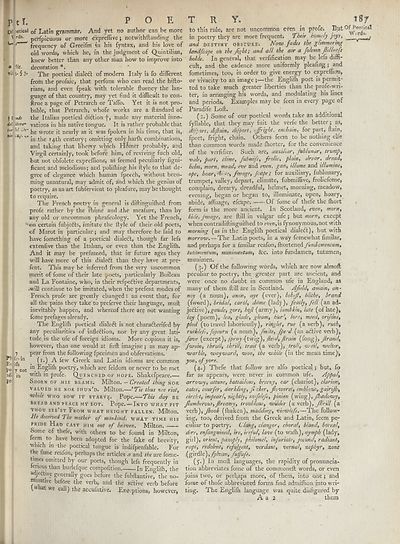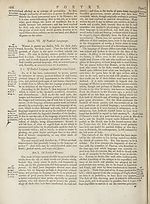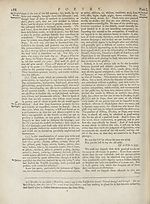Encyclopaedia Britannica > Volume 15, PLA-RAM
(225) Page 187
Download files
Complete book:
Individual page:
Thumbnail gallery: Grid view | List view

p 11.
of letieai
\ rds.
* lit.
vii i- § 3-
| 1 ’nJe
iel it era-
tut 'el iJe¬
nin -'ll-', v
in
Er ifli
po y not
ufi in
pr
POE
of Latin grammar. And yet no author can he more
perfplcuous or more exprefiive ; notwithftanding the
frequency of Grecifm in his fyntax, and his love of
old words, which he, in the judgment of Quintilian,
knew better than any other man how to improve into
decoration *.
The poetical dialeft of modern Italy is fo different
from the profaic, that perfons who can read the hifto-
rians, and even fpeak with tolerable fluency the lan¬
guage of that country, may yet find it difficult to con-
ftrue a page of Petrarch or Taffo. Yet it is not pro¬
bable, that Petrarch, whofe works are a llandard of
the Italian poetical di&ion f, made any material inno¬
vations in his native tongue. It is rather probable that
he wrote it nearly as it was fpoken in Ins time, that is,
in the 14th century; omitting only harfh combinations,
and taking that liberty which Horner probably, and
Virgil certainly, took before him, of reviving fuch old,
but not obfolete expreffions, as feemed peculiarly ligni-
ficant and melodious; and polifliing his llyle to that de¬
gree of elegance which human fpeech, without beco¬
ming unnatural, may admit of, and which the genius of
poetry, as an art fubfervient to pleafure, may be thought
to require.
z The French poetry in general is diftinguifhed from
profe rather by the fhime and the meafure, than by
any old or uncommon phrafeology. Yet the French,
on certain fubje&s, imitate the ityle of their old poets,
of Marot in particular; and may therefore be faid to
have fomething of a poetical dialed!, though far lefs
extenfive than the Italian, or even than the Englifh.
And it may be prefumed, that iff future ages they
will have more of this dialed! than they have at pre-
fent. This may be inferred from the very uncommon
merit of fome of their late poets, particularly Boileau
and La Fontaine, who, in their refped!ive departments,
.will continue to be imitated, when the prefent modes of
French profe are greatly changed : an event that, for
all the pains they take to prefierve their language, mul!
inevitably happen, and whereof there are not wanting
fome prefages already.
The Englifh poetical dialed! is not charad!erifed by
any peculiarities of infledfion, nor by any great lati¬
tude in the ufe of foreign idioms. More copious it is,
however, than one would at firft imagine ; as may ap¬
pear from the following fpecimen and obfervations.
(1.) A few Greek and Latin idioms are common
in Englifli poetry, which are feldom or never to be met
with in profe. Quenched of hope. Shakefpeare.—
Shorn of his beams. Milton. — Created thing nor
valued HE nor shun'd. Milton.—’77r thus *ve riot,
ivbi/e who sow it starvj£. Pope.—This day be
BREAD AND PEACE MY LOT. Pope. — INTO WHAT PIT
thou see’st From what height fallen. Milton.
He deceived The mother of mankind, what time his
pride FIad cast him out of heaven, Milton.——
Some of thefe, with others to be found in Milton,
feem to have been adopted for the fake of brevity,
■which in the poetical tongue is indifpenfable. For
the fame reafon, perhaps the articles a and the are fome-
tunes omitted by our poets, though lefs frequently in
krmus than burlefque compofition In Englifh, the
adjedfive generally goes before the fubftantive, the no¬
minative before the verb, and the adlive verb before
(wiat we call) the acculative. Exceptions, however,
T R Y.
to this rule, are not uncommon even in profe.
187
But Of Poetical
in poetry they are more frequent. Theit homely jays, ^ ^ ^ ^
and destiny obscure. Now fades the glimmering
landfcape on the fight; and all the air a folemn Jlillvefs
holds. In general, that veriification may be lefs diffi¬
cult, and the cadence more uniformly pleafing; and
fometimes, too, in order to give energy to expreffion,
or vivacity to an image ;—the Englifli poet is permit¬
ted to take much greater liberties than the profe-wri¬
ter, in arranging his words, and modulating his lines
and periods. Examples may be feen in every page of
Paradife Loft.
( 2.) Some of our poetical words take an additional
fyllable, that they may fuit the verfe the better; as,
dr fart, dijlain, difport, affright, enchain, for part, ftain,
fport, fright, chain. Others feem to be nothing elfe
than common words made fborter, for the convenience
of the verfifier. Such are, auxi/iar, fublunar, trump,
vale, part, clime, fubmifs, frolic, plain, drear, dread,
helm, morn, mead, eve and even, gan, illume and illumine,
ope, hoar, id'te, /wage, fcape; for auxiliary, fublunary,
trumpet, valley, depart, climate, fubmiffive, froliefome,
complain, dreary, dreadful, helmet, morning, meadow,
evening, began or began to, illuminate, open, hoary,
abide, affuage, efcape. Of fome of thefe the fhort
form is the more ancient. In Scotland, even, morn,
bide. Jwage, are ftill in vulgar ufe ; but morn, except
when contradiftinguifhed to even,is fynonymous,not with
morning (as in the Englifh poetical dialed!), but with.
morrow.—The Latin poets, in a way fomewhat fimilar,
and perhaps for a fimilar reafon, fhortened fundamentum,
tutamentum, munimentum, See. into fundamen, tutamen*
mummen.
(^.) Of the following words, which are now almoft:
peculiar to poetry, the greater part are ancient, and
were once no doubt in common ufe in England, as
many of them ftill are in Scotland. Afield, amain, an¬
noy (a noun), anon, aye (ever), behefl, blithe, brand
(fword), bridal, carol, dame (lady), featly, fell (an ad-
'^t!l\\>i),gaude, gore, hojl (army), lambkin, late (of late),
lay (poem), lea, glade, gleam, hur’, lore, meed, orifdns,
plod (to travel laborioufly), ringlet, rue (a verb), ruth,
ruth/ef, fojourn (a noun), fmite, fpe d (an active verb),
fave (except), fpray (twig), fle:d, /lrain (fong), Jlrand,
fivain, thrall, thrill, trait (a verb), troll, wail, welter,
warble, wayward, woo, the while (in the mean time),
yon, of yore.
(4.) Thefe that follow are alfo poetical; but, fo
far as appears, were never in common ufe. Appal,
arrowy, attune, battailous, breezy, car (chariot), clarion,
cates, courfer, darkling, Jl cker, floweret, embla%e, gairtfh,
circlet, impearl, nightly, noifelef, pinion (wing), fhadowy,
flumberous,flreamy, troublous, wilder (a verb), Jhnll (a
verb), fhook (fliaken), madding, viewkfs.—The follow¬
ing, too, derived from the Greek and Latin, feem pe¬
culiar to poetry. Clang, clangor, choral, bland, boreal,
dire, enfanguined, ire, ireful, lave (fo wafh), nymph (lady,
girl), orient, panoply, philomet, infuriate, jocund, radiant,
rapt, redolent, refulgent, verdant, vernal, zephyr, zone
(girdle), fuff ufe.
(5.) In moft languages, the rapidity of pronuncia¬
tion abbreviates fome of the commoneft words, or even
joins two, or perhaps more, of them, into one ; and
fome of thofe abbreviated forms find admiflion into wri¬
ting. The Englifh language was quite disfigured by
A a 2 - them
of letieai
\ rds.
* lit.
vii i- § 3-
| 1 ’nJe
iel it era-
tut 'el iJe¬
nin -'ll-', v
in
Er ifli
po y not
ufi in
pr
POE
of Latin grammar. And yet no author can he more
perfplcuous or more exprefiive ; notwithftanding the
frequency of Grecifm in his fyntax, and his love of
old words, which he, in the judgment of Quintilian,
knew better than any other man how to improve into
decoration *.
The poetical dialeft of modern Italy is fo different
from the profaic, that perfons who can read the hifto-
rians, and even fpeak with tolerable fluency the lan¬
guage of that country, may yet find it difficult to con-
ftrue a page of Petrarch or Taffo. Yet it is not pro¬
bable, that Petrarch, whofe works are a llandard of
the Italian poetical di&ion f, made any material inno¬
vations in his native tongue. It is rather probable that
he wrote it nearly as it was fpoken in Ins time, that is,
in the 14th century; omitting only harfh combinations,
and taking that liberty which Horner probably, and
Virgil certainly, took before him, of reviving fuch old,
but not obfolete expreffions, as feemed peculiarly ligni-
ficant and melodious; and polifliing his llyle to that de¬
gree of elegance which human fpeech, without beco¬
ming unnatural, may admit of, and which the genius of
poetry, as an art fubfervient to pleafure, may be thought
to require.
z The French poetry in general is diftinguifhed from
profe rather by the fhime and the meafure, than by
any old or uncommon phrafeology. Yet the French,
on certain fubje&s, imitate the ityle of their old poets,
of Marot in particular; and may therefore be faid to
have fomething of a poetical dialed!, though far lefs
extenfive than the Italian, or even than the Englifh.
And it may be prefumed, that iff future ages they
will have more of this dialed! than they have at pre-
fent. This may be inferred from the very uncommon
merit of fome of their late poets, particularly Boileau
and La Fontaine, who, in their refped!ive departments,
.will continue to be imitated, when the prefent modes of
French profe are greatly changed : an event that, for
all the pains they take to prefierve their language, mul!
inevitably happen, and whereof there are not wanting
fome prefages already.
The Englifh poetical dialed! is not charad!erifed by
any peculiarities of infledfion, nor by any great lati¬
tude in the ufe of foreign idioms. More copious it is,
however, than one would at firft imagine ; as may ap¬
pear from the following fpecimen and obfervations.
(1.) A few Greek and Latin idioms are common
in Englifli poetry, which are feldom or never to be met
with in profe. Quenched of hope. Shakefpeare.—
Shorn of his beams. Milton. — Created thing nor
valued HE nor shun'd. Milton.—’77r thus *ve riot,
ivbi/e who sow it starvj£. Pope.—This day be
BREAD AND PEACE MY LOT. Pope. — INTO WHAT PIT
thou see’st From what height fallen. Milton.
He deceived The mother of mankind, what time his
pride FIad cast him out of heaven, Milton.——
Some of thefe, with others to be found in Milton,
feem to have been adopted for the fake of brevity,
■which in the poetical tongue is indifpenfable. For
the fame reafon, perhaps the articles a and the are fome-
tunes omitted by our poets, though lefs frequently in
krmus than burlefque compofition In Englifh, the
adjedfive generally goes before the fubftantive, the no¬
minative before the verb, and the adlive verb before
(wiat we call) the acculative. Exceptions, however,
T R Y.
to this rule, are not uncommon even in profe.
187
But Of Poetical
in poetry they are more frequent. Theit homely jays, ^ ^ ^ ^
and destiny obscure. Now fades the glimmering
landfcape on the fight; and all the air a folemn Jlillvefs
holds. In general, that veriification may be lefs diffi¬
cult, and the cadence more uniformly pleafing; and
fometimes, too, in order to give energy to expreffion,
or vivacity to an image ;—the Englifli poet is permit¬
ted to take much greater liberties than the profe-wri¬
ter, in arranging his words, and modulating his lines
and periods. Examples may be feen in every page of
Paradife Loft.
( 2.) Some of our poetical words take an additional
fyllable, that they may fuit the verfe the better; as,
dr fart, dijlain, difport, affright, enchain, for part, ftain,
fport, fright, chain. Others feem to be nothing elfe
than common words made fborter, for the convenience
of the verfifier. Such are, auxi/iar, fublunar, trump,
vale, part, clime, fubmifs, frolic, plain, drear, dread,
helm, morn, mead, eve and even, gan, illume and illumine,
ope, hoar, id'te, /wage, fcape; for auxiliary, fublunary,
trumpet, valley, depart, climate, fubmiffive, froliefome,
complain, dreary, dreadful, helmet, morning, meadow,
evening, began or began to, illuminate, open, hoary,
abide, affuage, efcape. Of fome of thefe the fhort
form is the more ancient. In Scotland, even, morn,
bide. Jwage, are ftill in vulgar ufe ; but morn, except
when contradiftinguifhed to even,is fynonymous,not with
morning (as in the Englifh poetical dialed!), but with.
morrow.—The Latin poets, in a way fomewhat fimilar,
and perhaps for a fimilar reafon, fhortened fundamentum,
tutamentum, munimentum, See. into fundamen, tutamen*
mummen.
(^.) Of the following words, which are now almoft:
peculiar to poetry, the greater part are ancient, and
were once no doubt in common ufe in England, as
many of them ftill are in Scotland. Afield, amain, an¬
noy (a noun), anon, aye (ever), behefl, blithe, brand
(fword), bridal, carol, dame (lady), featly, fell (an ad-
'^t!l\\>i),gaude, gore, hojl (army), lambkin, late (of late),
lay (poem), lea, glade, gleam, hur’, lore, meed, orifdns,
plod (to travel laborioufly), ringlet, rue (a verb), ruth,
ruth/ef, fojourn (a noun), fmite, fpe d (an active verb),
fave (except), fpray (twig), fle:d, /lrain (fong), Jlrand,
fivain, thrall, thrill, trait (a verb), troll, wail, welter,
warble, wayward, woo, the while (in the mean time),
yon, of yore.
(4.) Thefe that follow are alfo poetical; but, fo
far as appears, were never in common ufe. Appal,
arrowy, attune, battailous, breezy, car (chariot), clarion,
cates, courfer, darkling, Jl cker, floweret, embla%e, gairtfh,
circlet, impearl, nightly, noifelef, pinion (wing), fhadowy,
flumberous,flreamy, troublous, wilder (a verb), Jhnll (a
verb), fhook (fliaken), madding, viewkfs.—The follow¬
ing, too, derived from the Greek and Latin, feem pe¬
culiar to poetry. Clang, clangor, choral, bland, boreal,
dire, enfanguined, ire, ireful, lave (fo wafh), nymph (lady,
girl), orient, panoply, philomet, infuriate, jocund, radiant,
rapt, redolent, refulgent, verdant, vernal, zephyr, zone
(girdle), fuff ufe.
(5.) In moft languages, the rapidity of pronuncia¬
tion abbreviates fome of the commoneft words, or even
joins two, or perhaps more, of them, into one ; and
fome of thofe abbreviated forms find admiflion into wri¬
ting. The Englifh language was quite disfigured by
A a 2 - them
Set display mode to:
![]() Universal Viewer |
Universal Viewer | ![]() Mirador |
Large image | Transcription
Mirador |
Large image | Transcription
Images and transcriptions on this page, including medium image downloads, may be used under the Creative Commons Attribution 4.0 International Licence unless otherwise stated. ![]()
| Encyclopaedia Britannica > Encyclopaedia Britannica > Volume 15, PLA-RAM > (225) Page 187 |
|---|
| Permanent URL | https://digital.nls.uk/191903701 |
|---|
| Attribution and copyright: |
|
|---|
| Description | Ten editions of 'Encyclopaedia Britannica', issued from 1768-1903, in 231 volumes. Originally issued in 100 weekly parts (3 volumes) between 1768 and 1771 by publishers: Colin Macfarquhar and Andrew Bell (Edinburgh); editor: William Smellie: engraver: Andrew Bell. Expanded editions in the 19th century featured more volumes and contributions from leading experts in their fields. Managed and published in Edinburgh up to the 9th edition (25 volumes, from 1875-1889); the 10th edition (1902-1903) re-issued the 9th edition, with 11 supplementary volumes. |
|---|---|
| Additional NLS resources: |
|

